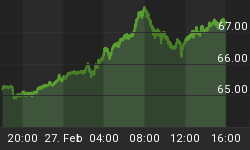Why Is Market Breadth Relevant?
According to Investopedia, market breadth is:
A mathematical formula that uses advancing and declining issues to calculate the amount of participation in the movement of the stock market. By evaluating how many stocks are increasing or decreasing in price..., breadth indicators can show whether overall market sentiment is bullish (positive market breadth) or bearish (negative market breadth). Investors can also use breadth indicators to evaluate the behavior of a particular industry or sector, or to analyze the magnitude of a rally or retreat.
Breadth's Warning In 1999-2000
While "mathematical formula" can sound complex, common sense tells us that if more stocks are making new lows than stocks making new highs, the major stock market indexes are more vulnerable to a sell-off. For example, market breadth started waving yellow flags well before the S&P 500 peaked in March 2000. In the charts that follow, the breadth indicator is shown on top and the S&P 500 is shown on the bottom for reference purposes.

A Lower High In 2007
Was market breadth helpful before the waterfall declines in 2008? Yes, market breadth made a lower high as the S&P 500 made a higher high in October 2007 (see chart below). The lower high told us fewer and fewer stocks were participating in the push to new highs in late 2007.

2015: A Lower High In Breadth?
The chart below shows the same breadth indicator in 2015 (on the same timeframe with the same settings as the 2000 and 2007 charts above). Rather than siding with the bearish case for stocks, the recent higher high in breadth represents a "bullish divergence" relative to the lower high in the S&P 500 Index. The chart below is as of 10:58 am EDT on Tuesday, March 31, 2015.

What Is Breadth Telling Us?
Is market breadth the silver bullet of market timing? Absolutely not, which is why our market model uses numerous inputs to monitor the market's risk-reward profile. The recent higher high in breadth tells us the odds of a new bear market in stocks kicking off in the coming weeks are lower than some may believe. However, a market correction scenario, where stocks drop and then push to new highs, cannot be taken off the probability table. One important distinction between a correction and a bear market is that a correction is followed by a higher high in stocks, a feature that does not come with the bear market package.
Ratios Align With Breadth
Is there other "keep an open mind about bullish outcomes" evidence that aligns with the read from market breadth? Yes, this video clip covers numerous risk ratios that have not rolled over in a "risk-off" manner. As always, if the evidence begins to side with the bears, it is important that we evaluate the hard data with an unbiased and open mind.















